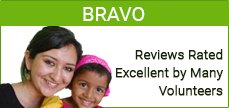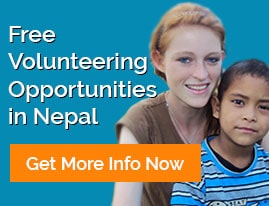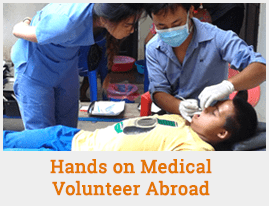VOLUNTEER IN ARGENTINA
' I LOVE this experience in chitwan for though short period! '
Xue Ying Fiona WangArgentina FAQs
Disclaimer: The information given in this FAQ's page is generic. You should verify critical information such as visa-related issues, health and safety, customs and transportation with the relevant authorities prior to traveling. Please be aware that information given in FAQ's may change at any time. In effect, we accept no responsibility for any loss, injury or inconvenience sustained by anyone resulting from this information. For the latest updates, please contact us or our in-country coordinator(s).
General Information
The founder of RCDP has been involved in volunteer abroad business for the last 10 years. During this time, he has worked with more than 2000 volunteers and more than 200 universities, colleges, and schools groups.
Working with inspiring college students and humanitarian volunteers was very motivating as well as very enjoyable and presented many exciting learning opportunities. This experience encouraged him to start his own volunteer abroad program where affordable prices, premium programs and meaningful contributions to deprived communities would become the key components of the programs.
With this in mind, while setting up volunteer and travel abroad organization, we have selected many safe and culturally rich destinations where volunteers can make meaningful contributions, immerse in local culture, and get enriched from volunteer abroad experience. In each destination, we have carefully selected projects, host families, travel coordinating staff, and placed local support staff. We have provided them with extensive training to manage the program with professional services that will be delivered with care and respect for all volunteers. We are now proud of our coordinators, host families, host projects, and staff as all of them have at least 4 years of working experience with international volunteers. To meet your expectation, they are committed to working hard to meet your expectations, delivering professional services, and turn your volunteer abroad experience into a memorable journey.
In Argentina, we operate in the city of Cordoba, which is about 380 miles north of Buenos Aires, the capital and largest city in Argentina..
Information on Application
Starting application
There are two options available to those applying for volunteer positions in the Argentina programs:
- Apply online (http://rcdpinternationalvolunteer.org/apply.php)
- Download the application form. Then, fill it out, and mail to RCDP.
After submitting application
Once RCDP receives your application, it will immediately be forwarded to Argentina for processing. Our Argentina In-Country coordinator will then carefully review your application to ensure you get placed in the project that matches your criteria and your qualifications.
Duration of the application process
Once the Argentina In-Country coordinator finalizes and forwards us the detail, we will immediately send it to you. The whole process normally takes 1-2 weeks. However, this can sometimes take longer.
You will also find an invoice requesting you to pay the program fee along with the placement details.
Preparation
Once you receive the placement details, you can even call our Argentina office directly and speak to our In-Country coordinator and ask any questions that might prepare you for the trip.
Preparation for Argentina trip includes: reading about Argentina, vaccination, Visa arrangement, booking tickets. If you experience ANY problems, please call RCDP office.
Once you purchase air tickets, they should immediately submit the flight details to BOTH RCDP and Argentina office.
Information on Airport and Arrival
Volunteers should arrive at Ingeniero Aeronáutico Ambrosio L.V. Taravella International Airport, which is about 9km northwest from the center of Cordoba. The airport is also more commonly known as Pajas Blancas. Volunteers can either fly directly to Cordoba or first fly to Buenos Aires and transfer to Cordoba.
In Cordoba, one of our representatives will be waiting for you in the arrival lounge in the airport holding a placard with your name on it. This will happen without fail if you have passed on your travel itinerary to our office. If you want to be absolutely sure, you can call your Argentina office and talk to our In-Country coordinator.
Flight Delayed or Missed
If your flight gets delayed or if you miss your flight and book yourself with a later flight, please let us know immediately by either calling our office. You must try to call first and then email the details if possible. Look at your placement details for all the contact information. If you cannot make any contact and no one receives you at the airport, look at your placement details, hire a prepaid taxi and go to the hotels recommended on it. Let the In-Country coordinator know your whereabouts after your arrive at the hotel or the next day. The coordinator will arrange a pick up later.
Arrival Day
Volunteers are requested to arrive one day before the start of program. If volunteers arrive more than one day earlier or remain after the close of their program, they will be responsible for their own for providing their own accommodation and meal.
Information on Accommodation and Meal
RCDP will manage your entire accommodation, meal and supervision initially in Cordoba.
During volunteer period, you will stay in a hostel. For meals volunteers will need to eat out. Please budget around $40 a week for your mails. You can find details of the room/food accommodations in the placement sheets for your project.
Our staff will visit volunteers in Cordoba every seven to fourteen days.
Information on Visa
You will need a visa to visit Argentina and it is volunteer's responsibility to obtain one. Please apply for a tourist visa and get one from Argentina Embassy from our country before departing.
Please call our office or contact your nearest Argentina embassy to learn more about visa, visa fees and visa extensions. Much information can be learned online by searching out Argentina's embassy or consulate.
Information on Health and Safety
Visit the sites listed below and acquire as much information as possible. Remember there is no harm in knowing more when it comes to health and safety.
- WHO website for international travelers (http://www.who.int/csr/ihr/en)
- Centers for Disease Control & Prevention
1600 Clifton Road , NE
Atlanta , GA 31333
(888) 232-3228
(888) 232-3299 - fax information service - Health Canada Online
- Canadian Department of Foreign Affairs and International Trade and Travel Report
- U.S. State Department & Consular Information Sheets
Room 4811
2201 C Street NW
Washington , DC 20520
(202) 647-5225 - Travel Health Online
- Travelers' Health
General Health Tips for Volunteer in Argentina
- In most of Argentina, drinking water is quite safe. However, in rural areas, drink only bottled, boiled water or carbonated drinks of cans and bottles. In the beaches, tap water is not considered clean.
- Buy bottled water from proper outlets. Be wary of fake bottled water which are available everywhere. Always make sure the seal is not broken and the cap not tampered with.
- Avoid eating food from road side stalls/vendors. Don't eat unpeeled fruits or fruits that have already been cut by unknown handlers on the street. If you are forced to eat food at a place that you have doubts about, make sure the food is served hot.
- If you require any prescription drugs, bring enough for the duration of your stay in Argentina. They will need to be carried in their original prescription bottle and the prescription must be in your name.
- Please carry a small health kit which should include medicines for upset stomachs, some antiseptic cream, hydration powder, deer mosquito repellant, sun block, band aids, etc.
Information on Vaccinations
Please visit Center for Disease Control's website ( www.cdc.gov ) for traveler's health recommendations. Your travel doctor will be knowledgeable about current epidemics and should be consulted.
Recommended Vaccinations and Preventive Medications
See a health-care provider at least 4–6 weeks before your trip to allow time for your vaccines to take effect and to start taking medicine to prevent malaria, if you need it. Even if you have less than 4 weeks before you leave, you should still see a health-care provider for needed vaccines, anti-malaria drugs and other medications and information about how to protect yourself from illness and injury while traveling.
The following vaccines may be recommended for your travel to South America including Argentina. Discuss your travel plans and personal health with a health-care provider to determine which vaccines you will need.
- Routine: such as for influenza, chickenpox (or varicella), polio, measles/mumps/rubella (MMR), and diphtheria/pertussis/tetanus (DPT) are given at all stages of life
- Hepatitis A or immune globulin (IG). Transmission of hepatitis A virus can occur through direct person-to-person contact; through exposure to contaminated water, ice, or shellfish harvested in contaminated water; or from fruits, vegetables, or other foods that are eaten uncooked and that were contaminated during harvesting or subsequent handling.
- Hepatitis B, especially if you might be exposed to blood or body fluids (for example, health-care workers), have sexual contact with the local population, or be exposed through medical treatment. Hepatitis B vaccine is now recommended for all infants and for children ages 11-12 years who did not receive the series as infants.
- Malaria: if you are traveling to a malaria-risk area in this region, see your health care provider for a prescription anti-malarial drug.
- Rabies
- Typhoid vaccine. Typhoid fever can be contracted through contaminated drinking water or food, or by eating food or drinking beverages that have been handled by a person who is infected. Large outbreaks are most often related to fecal contamination of water supplies or foods sold by street vendors
- As needed, booster doses for tetanus-diphtheria , measles , and a one-time dose of polio vaccine for adults.
Required Vaccinations
- A certificate of yellow fever vaccination may be required for entry into certain countries in East Africa. For detailed information, see Yellow Fever Vaccine Requirements and Information on Malaria Risk and Prophylaxis, by Country . Also, find the nearest authorized U.S. yellow fever vaccine center.
Information on Monetary Issues
Currency
Argentinean currency is "Peso" (ARS).
Exchanging
There are no restrictions for changing currency in Argentina. US Dollars are commonly accepted in most hotels but you must exchange your currency into Peso for daily expenses. Volunteers are advised to exchange money in banks because they offer more security and guarantees.
ATM/Debit Card/Debit Card/Travelers Checks
ATM machines are available at various regions throughout Argentina, especially in Cordoba and the airport, where the option to take out US dollars or Shelling is available.
Do not arrive in Argentina without any cash as ATM machines can not work or fail to accept your card, though this rarely happens are all machines and for long. Check with your bank to confirm that your card will work overseas. Debit cards and credit cards are acceptable at major stores. Travelers' checks are exchanged at the banks. In most locations, you won't be able to exchange them. Debit card is the best way of getting the money out and ATM vendors are available through urban areas in Argentina. Visa, MasterCard and American Express are accepted in large stores and hotels in larger cities.
Budget
You can get by with US $30 a day provided you are careful in taking your money out. Accommodation during your project is free but for other activities please budget accordingly.
Information on Field Support and Supervision
We keep in touch with our volunteers. Our staffs visit volunteers every 2 weeks. You are encouraged to contact us if you want to speak to us about anything. You will be provided with all the contact information.
Information on Communicating
Internet cafes are available in Argentina and Cordoba.
You can also use international phone cards to call home. You will be provided with full contact details of our office in Argentina. You are encouraged to call us if you want to discuss anything. In addition, our program staff will visit you regularly to check your progress.
Information on Weather
Argentina is a treat for anyone wanting to experience diverse climate. From hot deserts, dry forest, humid savannas, rainforests to cold plateaus and icy mountains where snow remains all year, Argentina's got everything that nature throws at us.
Typically though, the northern regions are hotter, while Patagonia and further south is extremely cold.
- BBC Weather
- Yahoo Weather forecast ( http://weather.yahoo.com )
- Weather channel ( http://www.weather.com )
- Weather Underground (http://www.wunderground.com )
Information on Materials to Bring
- Camera
- Mobile phone (you can use mobile phones after changing sim cards)
- Sleeping bag (only if you want to camp outside)
- Mosquito repellents
- Insect repellents
- Sun block lotions
- Volunteer hat (if you are joining conservation or construction project)
- Some books of Argentina
- Map of Argentina
- Toiletries
- First-aid kits
- Flash light
- Electricity adapter/converter
- Sunglasses
- Walking shoes (for work and travel)
- Towel
Information on Bringing Gifts for Project
It will be a nice gesture if you bring items like books, pencils, color pens, toys and games, especially if you are volunteering in schools and orphanages.
You can also bring things like chocolates, CD and T-Shirts to the project.
 1-2543048951
1-2543048951


